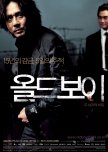
Everything you could want from a movie. Old Boy is EVERYTHING you could want from a movie!
Park Chan Wook is a mastermind - First Joint Security Area and then The Vengeance Trilogy! It says something about film journalists that nobody wrote about Park Chan Wook before Oldboy won the grand jury prize at Cannes 2004. Oldboy is the second part (Sympathy for Mr. Vengeance was the first) in a planned revenge trilogy. Sympathy for Lady Vengeance is the third and final instalment.Dae-su wakes up in an empty room. The door is locked, no windows. His only company is the television. He gets food through a hatch. He works out, writes in his diary. Via the television, he learns that he is wanted for the murder of his wife. His daughter has been adopted by a Swedish couple (a fun small detail because a Swedish soldier also figures in Joint Security Area.) He has been stripped of everything that matters and worst of all, he doesn't know what he did to deserve it! He is fixed, every day is the same. Claustrophobia turns to despair. He tries to commit suicide but fails. After 15 years he is released. Who locked him up?! Why was he locked up!? Why was he released?!
The film is based on a Japanese manga.
Cet avis était-il utile?

Cette critique peut contenir des spoilers
Absurd, twisted and deliciously dark family saga.
The gap between the poor and the rich is depicted with sharp humor, unexpected twists and a lot of darkness in Bong Joon-ho's Parasite. It's a lovely black comedy about the most twisted household since Dogtooth.Despite unemployment and poverty, Ki-taek and his family manage to keep their spirits up. Mom, dad and two soon-to-be-grown children are crammed into a shabby basement in a run-down alley, constantly looking for odd jobs and free wifi. The family doesn't have much, but they have a nice cohesion, cordial jargon and ambitions for a better life.
When the son Ki-woo receives a tip about a job with a rich family, the possibilities for an extra income open up. With a forged university diploma, he gets a job as an English teacher for the Park family's teenage daughter. Also living in the luxurious villa is a businessman, his housewife, a quiet guy who mostly expresses himself through drawings, and the housekeeper who keeps everyone in order.
Ki-woo soon seizes the chance to arrange a job for his sister, Ki-jung, as the boy's "art therapist". He advises Mrs. Park of "a talented acquaintance," who is "probably very busy," but he will do his best to arrange a meeting. On false credentials and with made-up names, both siblings have soon tricked themselves into employment with the wealthy family.
How long can they keep up the lies, and how far can the charade go? This is just the beginning of a twisted scenario that Bong Joon-ho (Snowpiercer, Okja) has so masterfully directed. Here is the DNA of both the Sune family and the absurd Greek Dogtooth (2009) from Yorgos Lanthimos. While Parasite feels completely original, never predictable, and impossible to put into a single genre box.
Comedy and tragedy go hand in hand through Bong's twisty corridors, and you never know what awaits around the next corner. Parasite is a film that is best experienced without knowing anything in advance. It's an entertaining story that grabs me early on with its delightful humor, and then just tightens its grip more and more as the film goes on.
Not entirely unsurprisingly, the director also talks about the gaps between those who have money and those who have none. You can see the film as a commentary on a society where the poor take desperate measures to climb out of their misery, and where the rich turn a blind eye to what is happening in the outside world. Bong Joon-ho has made one of the best movies of 2019, and I'm loving every second of it!
Cet avis était-il utile?

Lots of action but messy script.
When Squid Games Lee Jungjae takes the director's chair to give his version of what the machinations of the South Korean security police in the 80s might have looked like, there is no shortage of impressive action scenes. Lee Jungjae and Jung Woosung in the lead roles make up a charismatic duo, but on the whole, Hunt is unfortunately a fairly messy film experience...The year is 1983, 4 years after the fall of dictator Park Chunghee. But the new president is also a dictator, which provokes protests from the South Korean immigrant population in the United States before his visit. “Drive him out,” they shout, and when the South Korean officials wonder why they can't just drive the protesters away, Park Pyongho (Lee Jungjae), the head of the foreign affairs unit of Korea's Central Intelligence Agency (KCIA), patiently replies that they can't in the US (and gets the somewhat sarcastic answer that the protesters have very strong opinions about the homeland after abandoning it…).
The introduction shows the difference between the free country in the West, and the censorship and corruption back home. Because soon Park Pyungho is back in South Korea, where protesters are beaten and tortured, where corruption is high, and where you don't know who you can trust. Especially not as it is revealed that there is a North Korean spy within the KCIA, someone who goes by the code name "Donglim".
Park Pyungho is tasked with identifying the spy, but the same task is also assigned to Kim Jungdo (Jung Woo-sung) of the KCIA's domestic unit, which gives rise to an intense power struggle. Park Pyungho is a veteran of the agency while Kim Jungdo is a newcomer from the Korean Army. Park Pyungho comes across as the more sympathetic and righteous of the two men, especially as he condemns Kim Jungdo's use of torture in his interrogation methods. It turns out that he has his own experiences with these as Kim Jungdo previously interrogated him, which left him with permanent nerve damage in his hand.
Lee Jungjae is a lovely anti-hero (for sure, there are male melodrama ingredients here, the reluctant legal fighter who suffers the heavy injustices of life, and selflessly risks his life, accompanied by melancholic music). A tough guy who installs a corrupt leader within the unit, and protects the young and beautiful but secretive college student Yoojung (Go Younjung). He seems to have taken to her since her father was killed, but their actual relationship remains unclear for most of the film. Here we get some sort of explanation at the end, but everything else leaves us with question marks.
Because the spectacularly well-choreographed action sequences aren't always narratively supported enough to justify them. Much of the violence is unprovoked, and serves no narrative function. You almost get a little sense of what a German crime drama would look like if it was accidentally mixed with splatter. A traditional film adaptation cut together here and there, with interspersed violence from ear files to mass shootings and car chases and everything in between. The plot becomes difficult to follow.
This makes the movie experience a bit frustrating after a while. Spectacular action sequences and close-ups of the charismatic Lee Jungjae are not enough to fully sustain interest throughout the film's 2 hours and 11 minutes. Crime dramas and spy films work best with methodically planted clues that, while surprising, move the story forward - A story you can follow and understand.
Hunt carries too many secrets, too much unprovoked violence, and too dark motives. The characters may be moving in a time of psychological terror, where everyone around them is a potential enemy, but the script that conveys this must still be the audience's friend.
Cet avis était-il utile?

A completely perfect movie about love!
Past Lives is a rare love film, touching with its adorably simple visual language and accurate, but few-worded dialogue. The silence in this drama is more telling than spoken words could ever be.Love theme on film is about as worn out as a book on the bookshelf. Most varieties of complications and other entanglements, we have already seen unfold from various different angles. What is happening here is not really an exception. We've seen it before, but rarely has it been this wonderful and poignant. Playwright Celine Song, making her feature film debut, has both written and directed this subtle, and constantly vibrating masterpiece.
Past Lives is about Na Young and Hae Sung. We meet them as young kids at home in Seoul, when they are an innocently blushing couple, a boyfriend and a girlfriend. When she moves with her family to Canada, they lose touch. Many years later, they look each other up on Facebook and begin an intimate digital relationship. They are close despite the distance and can and do talk about anything. After a while, Nora (as Na Young is now called), to Hae Sung's great sadness, wants to take a break. Real life soon resurfaces, and they both begin new relationships. The feelings still remain and when they see each other many years later, their friendship is tested, but also their loyalty to their partners.
In a way, this is a classic triangle drama. The story revolves around two people, and mainly affects a third. The focus is on Nora and Hae Sung, and it is their lives and longings that we get to share, and it is them that we care about. At the same time, no drama happens in a vacuum, and their actions and choices will cast a shadow over others as well. This is a film about feelings, and about love then and now. It is also about past lives and about fate, but also about accepting what has become, and not chasing what could have been.
Song has written a story that creates shockwaves of emotion in us viewers. The film lies in wait with its seemingly unassuming style, and shoots emotional arrows at us when we least expect it. The experience is heartbreakingly sweet, honest and at the same time so painful that it tears me up inside.
At first glance, the photo is not very remarkable, but still everything is so incredibly beautiful and the color tone is pleasant. The camera makes interesting horizontal runs, as if in a circular movement, which envelops the drama, but which also carefully highlights what pulsates at its core.
The dialogue is sparse, with many, long gaps of silence. However, it is never long-winded or uneventful in these, because it is often in the silence that the drama takes place. What is not expressed in words is expressed in everything else we see, in the looks, in the awkward smiles and the intensely contradictory longing for what never was. Song relies on the power of stillness, but also on her tight acting trio of Greta Lee as Nora, Teo Yoo as Hae Sung and John Magaro as Nora's husband Arthur. They are all convincing and do everything exactly right. It's hard to explain what makes their acting so good in this, because it's really about the fact that it's not an acting we watch. They don't play, they just are. It is their presence in the situation and their trust in the story, which radiates such obviousness that it rubs off on us.
Past Lives is a fantastically fine and multifaceted film, as beautiful as it is painful and as low-key as it is explosive. As the film moves towards its inevitable end, there are questions left unexplained, but there's no rush in me to get any answers. The magic is in the enigmatic and unspoken, and when the film ends, I end so with tears in my eyes, but with a wide smile in my heart.
Cet avis était-il utile?

Cette critique peut contenir des spoilers
Masterpieces that enchant and amaze.
Class differences and deep obsession take center stage in Lee Chang-dong's dense Burning. One of 2018's masterpieces that is both shocking and fascinating."Everything is very uncertain and that is exactly what is so reassuring". That's what the character Tootiki said in the book Moomins and the Winter Wonderland, one of the most well-known Moomin books. And that phrase can absolutely be applied to Lee Chang-dong's film Burning with the slight change that it is not soothing but rather "magical".
When the Korean director returns to the big screen for the first time in 8 years after the fantastic Poetry, he has based the story on Haruki Murakami's short story Elephant Vanishes, but the film stands entirely on its own in the surprising plot.
In the beginning, we get to meet Jong-soo (Yoo Ah-in), a young man with a violent father who has to take care of their farm. Jong-soo himself is more interested in writing, but is hindered by his economic worker background. One day he runs into his childhood friend Hae-mi (Jun Jong-seo). They start hanging out and Jong-soo quickly falls in love with her, but when she goes to Africa for two weeks, things change.
When Hae-mi comes home, she has met Ben (Steven Yeun from The Walking Dead), a rich and well-to-do young man who lives in a lavish apartment and drives an expensive car. The trio begins to hang out, but after a long evening outside Jong-soo's house, unexpected and fiery desires are revealed and the plot suddenly takes a completely unexpected turn that makes Burning a fascinating mystery.
Lee works as usual with long takes, a 10-minute dance at a sunset is one of the closest visual poetry you can get, and portrays the contrasts in Jong-soo's and Ben's lives through both subtle and clear scenes. The film requires you to accept that it takes a while to get into Lee's naturalistic grasp, but once you do, you can't take your eyes off the screen.
The second part of the film, which becomes a kind of existential riddle, is absolutely fantastic. You have no idea how it will end, but the feeling of discomfort and uncertainty is palpable. What actually happened? Was the cat that Hae-mi wanted Jong-soo to take care of really exist? Who is Ben? When will his cravings strike next? The questions are many and not all will necessarily be answered, but Lee relies on the audience's intelligence to be swept up in the plot more than to analyze it.
The actors are excellent in their roles, the film is technically well-made with well-chosen music and the sound contributes to the tight atmosphere. Burning is simply fantastic on every level. A film that, like life itself, happens before your eyes and then refuses to let go when it's over. Like a passionate burn that never leaves your skin.
Cet avis était-il utile?

Murderous children's games of the highest quality.
Are you in the game - Can you endure the game? The contestants of the hit series Squid Game may have thought that children's games were a simple match, but it turned out to be a delicate balance between life and death - Depicted in an absolutely brilliant way in this nerve-wracking Korean series.If you have everything to lose, well, you might as well lose everything. The almost 500 participants in the mysterious Squid Game are all hand-picked because they have one thing in common - They are all so destitute that they barely have anything to live for. Above their heads hang literally millions of won and herons, which in their situation and opinion could solve all their problems. The crux is that they have to get through a number of challenges - But they also have to win over the other participants.
Gi-Hun (Lee Jung-jae) is one of them - A daydreaming loser obsessed with gambling, something that has put him at odds with both his aging mother and his neglected 10-year-old daughter. When the chance in the form of a chuckling businessman (Gong Yoo, superstar from, among others, Train to Busan) appears, he quickly seizes it. Child's play, it can be very easy to get through and it is as planned so that he can grab the many well-pressed bundles of bills.
But if you lose in the games, well then you lose your life too. What begins with a chaotic Red-Green light soon leads to increasingly complicated games, and even behind the colorful backdrop of the game, trouble begins - Both with the participants but also within the other closed doors behind this giant puzzle land. Parallel to the bloody exciting games going on, we get to follow a detective (Wi Ha-Joon) who tries to uncover what is really happening - And why.
The entire world's Netflix audience seems to have opened their eyes to the mildly nerve-wracking and stress-filled massacres of children's games in the Korean Squid Game. Seasoned viewers of Korean K-dramas will see the usual depth of character mixed with thoughtfulness and a light dose of sentimentality. There is a moral to everything that happens on our screen - Nothing is really just a coincidence. At times it can be predictable, but how the story is told and how detailed it is can be at least as important as the result.
Psychological games and who we really are under pressure, we've seen that before. But rarely has it been done in such a charged, heartbreaking, and well-written way as in Squid Game - Which is also heavily sprinkled with social criticism. Is it our fault – Or is it the system's fault? Stay far away from the Hollywood of capitalism - No paws at a remake of Squid Game, then you have missed the point.
The disputes and thorns in Squid Game are many, and nerve-wracking. The series will keep you curled up and as if on pins and needles, throughout all of the series' nine clever and well-made episodes. Follow the k-hype with Parasite, Burning and Minari - But whatever you do - Skip the unnatural dubbing!
Cet avis était-il utile?
























